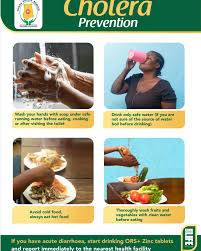Cholera Prevention: Ghanaians Urged to Eat Warm Foods for Protection
As Ghana faces an ongoing battle against cholera outbreaks, health authorities are issuing urgent advice to the public on how to prevent this deadly disease. One of the most effective preventive measures being emphasized is the importance of consuming warm foods. Cholera, a waterborne disease, is highly contagious and spreads through contaminated water and food, often leading to severe diarrhea, vomiting, and dehydration, which can be fatal if not treated promptly.
Ghanaians are being encouraged to avoid eating cold, uncooked, or improperly stored food, especially during the rainy season when the risk of contamination is higher. Warm foods, which are typically prepared under hygienic conditions and consumed immediately after cooking, reduce the chances of ingesting harmful bacteria or pathogens that cause cholera.
The reasoning behind this advice is simple: cholera-causing bacteria thrive in improperly handled food, particularly those that are exposed to unclean environments or left at room temperature for extended periods. Street food vendors, who often sell food in open air, are advised to ensure that the food they prepare is kept warm to kill bacteria and protect consumers.
Additionally, public health officials stress the importance of boiling water before drinking or cooking with it, as untreated water is another common source of cholera outbreaks. Hand hygiene is also a critical factor in preventing cholera transmission. Washing hands regularly with soap and clean water, especially before eating or handling food, can help reduce the spread of bacteria.
Experts recommend that Ghanaians practice caution by avoiding foods from unregulated vendors or areas where proper sanitation is questionable. Instead, they should prioritize meals that are freshly prepared and served hot, as these are less likely to be contaminated.
While cholera is preventable through proper sanitation and food safety practices, it remains a significant health threat in many parts of Ghana. The public's adherence to these preventive measures, including the consumption of warm foods, will play a vital role in controlling the spread of the disease and ensuring the health and safety of communities across the country.
In conclusion, cholera is preventable, and Ghanaians can significantly reduce their risk by taking simple precautions such as eating warm, freshly prepared food and practicing good hygiene. With collective effort, the nation can overcome the challenges posed by this disease.


